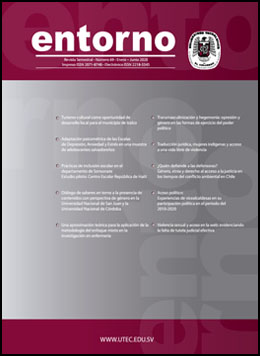Who is protecting the advocates? gender, ethnicity and the right to access to justice during the environmental conflict in Chile
DOI:
https://doi.org/10.5377/entorno.v0i69.9569Keywords:
Women - Legal situation - Chile, Legal assistance to women - Escazú accord - Chile, Action and defense (law/right) - Chile, Women at work for human rights - ChileAbstract
The legal and judicial framework in Chile were examined in this research with the objective to explain whether this guarantees an effective protection of the rights of an atrisk group: those women who protect the environment. Both the available routes and the behavior of the State were contrasted in relation to the protection of the women who advocate and defend the environment. This was carried out based on the standards established by the International Law, including the Escazú Agreement, which was not ratified by Chile. A theoretical contextualization of the problem was made and the feasibility for success in each of the identified judicial routes was projected. Among its conclusions, a lack of judicial actions to appropriately guard the rights of women in defense of the environment was found. It was recommended to have an alternative action model that allows to guarantee an effective access to justice.
Downloads
764
Downloads
Published
How to Cite
Issue
Section
License
© Entorno
It is required that the authors transfer the right of re-production of their articles to the Entorno Journal

